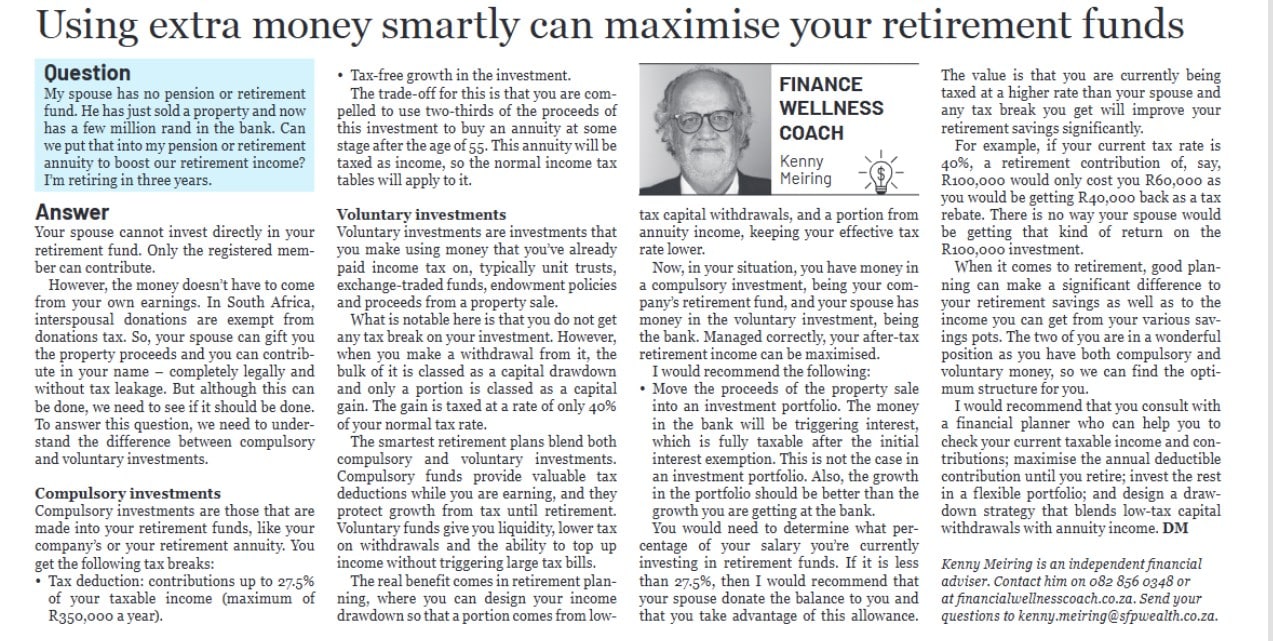No. 219 – Using extra money smartly can maximise your retirement funds
Question
My spouse has no pension or retirement fund. He has just sold a property and now has a few million in the bank. Can we put that into my pension or retirement annuity to boost our retirement income? I’m retiring in three years.
Answer
Your spouse cannot invest directly in your retirement fund. Only the registered member can contribute.
However, the money doesn’t have to come from your own earnings. In South Africa, interspousal donations are exempt from donations tax. So, your spouse can gift you the property proceeds, and you can contribute in your name — completely legally and without tax leakage.
So, while this can be done question we need to see if it should be done. To answer this question, we need to understand the difference between compulsory and voluntary investments.
Compulsory Investments
Compulsory investments are those investments that are made into your retirement funds like your company retirement fund or retirement annuity. What is important here is that you get the following tax breaks:
- Tax deduction – Contributions up to 27.5% of taxable income (max R350 000/year) will come with your taxable income
- Tax free growth – the growth inside the investment is tax free
The tradeoff for this is that you are compelled to use 2/3 of the proceeds of this investment to purchase an annuity at some stage after the age of 55. This annuity will be taxed as income so the normal income tax tables will apply to the annuity.
Voluntary investments
Voluntary investments are investments that you make using money that you’ve already paid income tax on. These would typically be unit trusts, ETF’s, endowment policies and proceeds from a property sale.
What is notable here is that you do not get any tax break on your investment however, when you make a withdrawal from this investment, the bulk of the investment is classed as a capital drawdown and only a portion will be classed as a capital gain. What is important, is that the gain is taxed at a rate of only 40% of your normal tax rate.
The smartest retirement plans blend both compulsory and voluntary investments.
- Compulsory funds provide valuable tax deductions while you are earning, and they protect growth from tax until retirement.
- Voluntary funds give you liquidity, lower tax on withdrawals, and the ability to top up income without triggering large tax bills.
The real benefit comes in retirement planning, where you can design your income drawdown so that a portion comes from low-tax capital withdrawals, and a portion from annuity income — keeping your effective tax rate lower.
Now, in your situation, you have money in a compulsory investment being your company’s retirement fund and your spouse has money in the voluntary investment, being the bank. If we manage this correctly, maximise your after tax retirement income.
What I would recommend that the two of you do is the following:
- Move the proceeds of the property sale out of the bank and into an investment portfolio. The money in the bank will be triggering interest which is fully taxable after the initial interest exemption. This is not the case in an investment portfolio. Also, the growth in the portfolio should be better than the growth you are getting at the bank. This is important as you are going to need these funds to last you for the next 35 years.
- You would need to determine what percentage of your salary you’re currently investing into retirement funds. If it is less than 27.5% then I would recommend that your spouse donate the balance to you and that you take advantage of this allowance. The value here is that you are currently being taxed at a higher rate than your spouse and that any tax break you’re going to be getting will improve your retirement savings significantly.
For example, if your current tax rate is 40%, A retirement contribution of say R100,000 would only cost you R60,000 as you would be getting R40,000 back as a tax rebate. There is no way that your spouse would be getting that kind of return on the R100,000 investment.
When it comes to retirement, a bit of planning can make a significant difference to your retirement savings as well as to the income that you can get from your various savings pots. The two of you are in a wonderful position as you have both compulsory and voluntary money so we can find the optimum structure for you.
What I would recommend is that you consult with a financial planner who can help you do the following:
- Check your current taxable income and contributions.
- Maximise the annual deductible contribution until you retire.
- Invest the rest in a flexible portfolio.
- Design a drawdown strategy that blends low-tax capital withdrawals with annuity income.
KENNY MEIRING IS AN INDEPENDENT FINANCIAL ADVISER
Contact him via phone, email or via contact phone on the financialwellnesscoach.co.za website

Read more of our articles on the Daily Maverick website or newspaper weekly!

